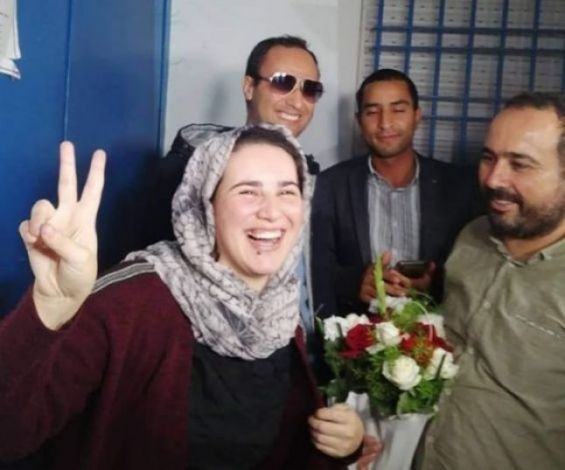On Wednesday, Moroccan journalist waved farewell to her prison cell after she was granted royal pardon, alongside her fiancé and gynecologist and his medical team. Sentenced to one year in jail for premarital sex and having an abortion, Raissouni was finally able to join her family and fiancé after she was arrested in August.
«This initiative came to correct a mistake (…) it proves that the young woman did not commit any of the offences she was prosecuted for, as she argued since the beginning of the trial», Raissouni’s lawyer Mohamed Sadkou told Yabiladi.
«Now that she has embraced freedom, it will be up to her to decide on the next step she wishes to take», said Sadkou, who announced before that his client appealed against the first instance ruling.
Furthermore, the lawyer lauded the royal decision, seeing it as «a message to the various parties», that according to him «must put an end to similar cases that violate the right to privacy».
Hajar’s lawyer was not the only one to hail the release of the Akhbar Al Yaoum journalist. Moroccan activist Souad Ettaoussi told Yabiladi that «the most important thing is that the young woman is out of prison».
The news «admits in a way or another that Hajar Raissouni and Rifaat Al-Amin were indeed engaged, which puts under the spotlight the terms of the Kingdom’s Family Code».
«Being engaged is a relationship that is recognized by the Penal Code, which is a very contradictory situation that profits from an archaic and oppressive moral order that should be fought against», Souad Ettaoussi argued.
The release of Hajar Raissouni should not put an end to the debate
«Having laws in the Penal Code that violate privacy is a flagrant violation of UN principles adopted by Morocco», Mohamed Sadkou argued. He recalled that «the country is expected to undergo reforms that respect these rights and individual freedoms».
A similar opinion was defended by Ettaouissi who said that «Morocco has signed and ratified international conventions and changing the laws must accompany these steps».
Moroccan sociologist and activist Mehdi Alioua also welcomed the release of Hajar Raïssouni. He believes that the royal pardon is «a sign of encouragement» that must help accelerate the debate on reforming laws related to individual freedoms.
«We cannot impose morals that Moroccans do not want any more (…) Our ways of living have evolved and the legal framework is not going hand in hand with this change».
«We need to launch a debate on individual freedoms and not only those related to sexual rights», Alioua argued. To him, the situation is bigger that this and it includes other forms of human rights and freedoms «such as the right to privacy, freedom of speech and the repression of opponents, journalists and human rights defenders».
Thus, Mehdi Alouia think that «the role of the police is not to put these people in prison but to peacefully manage the differences and preserve a healthy environment for debating».
Following the release of Raissouni, the Moroccan Association for Human Rights (AMDH) lauded the decision announced, Wednesday, stating that it is «an opportunity to put an end to restrictions imposed on activists, journalists and associations» in Morocco. The NGO also called for reforming laws that restrict liberties in general.




 chargement...
chargement...












